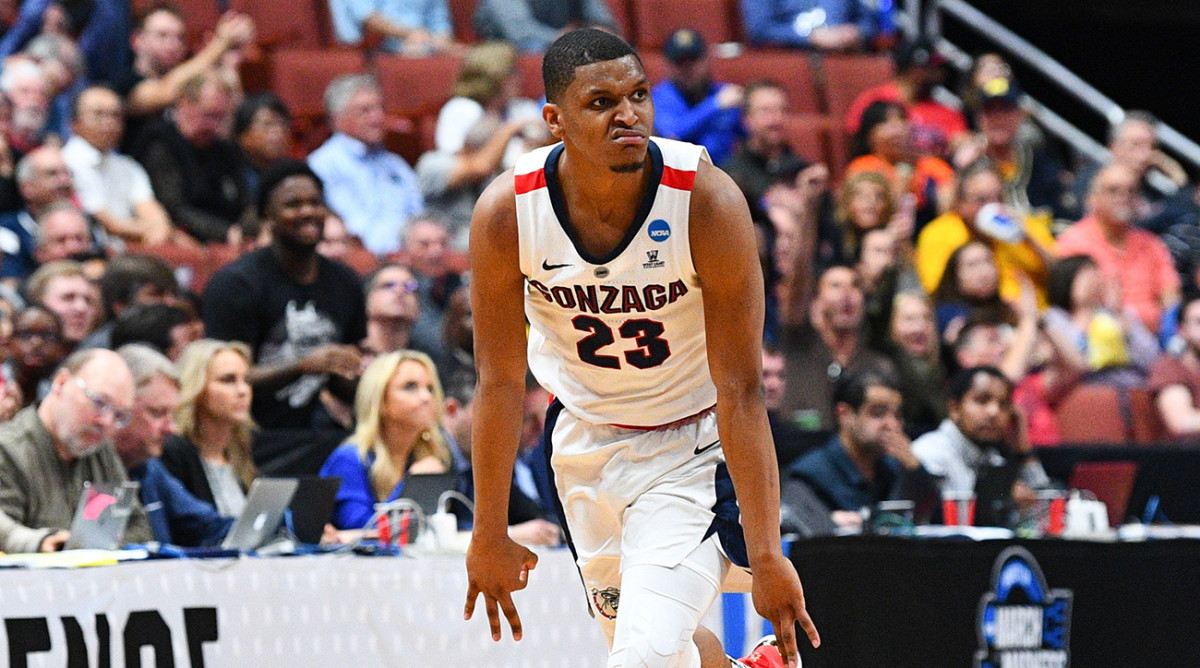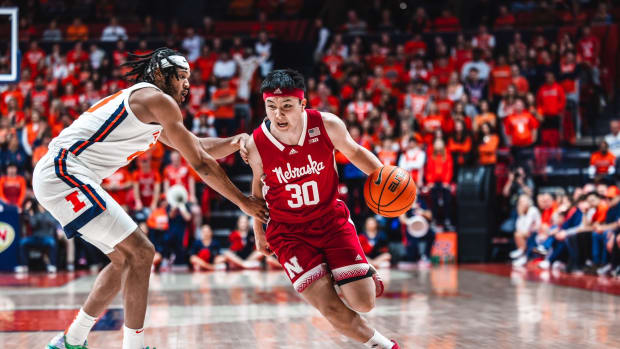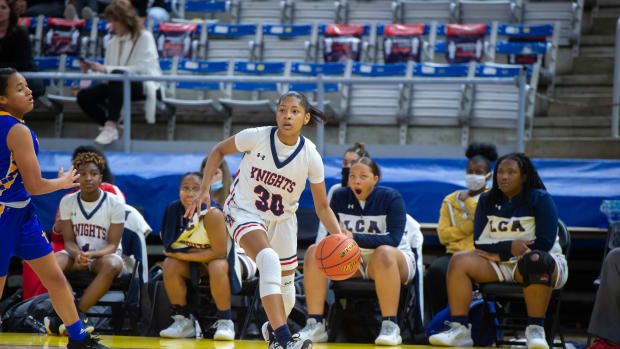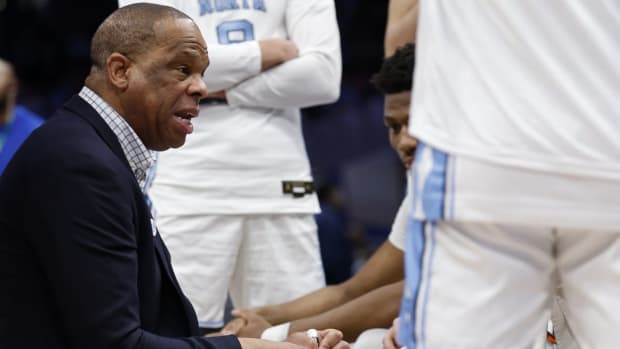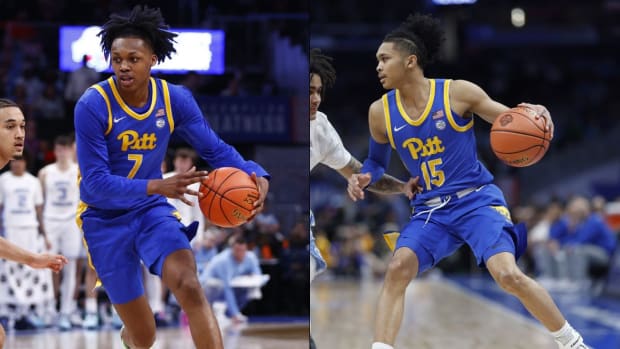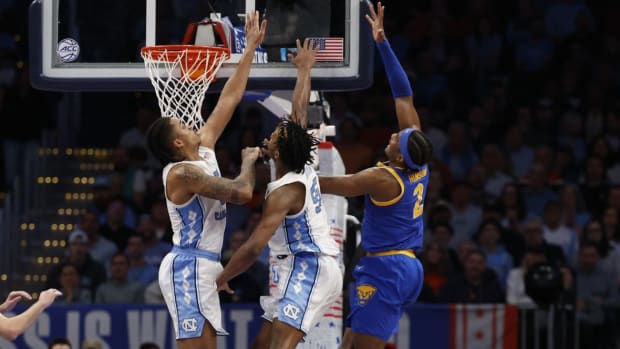Gonzaga's Quest for Unqualified Respect Continues With Revenge Win Over Florida State
ANAHEIM, Calif. — Inside the cramped Gonzaga locker room late Thursday, anyone who’d missed the game the Bulldogs had just played could be forgiven for wondering whether they’d won or lost. As an army of reporters advanced with their notepads and Marriott pens, the Zags shrugged, the evaluation of their 72–58 victory as clinical as their dominant performance against Florida State.
You have reached your limit of 4 premium articles
Register your email to get 1 more
The muted celebration only underscored the message the Zags had delivered at the Honda Center. They reminded anyone who still needed a reminder—those few, dwindling, stubborn souls—that Gonzaga is a perennial college basketball power and a threat to do the only thing that the Bulldogs have not done under coach Mark Few. That is, win the national title, a box the Zags could check in roughly 10 days.
That’s not to say Gonzaga lacks respect; it’s that Gonzaga’s respect seems to come with caveats. Still. Sure, the Bulldogs locked down the No. 1 seed in the West Region, the only non-Atlantic Coast Conference team to do so. But—and there’s always a but—they still play in the West Coast Conference, they lost to the Seminoles in the same round last year and they stumbled against Saint Mary’s in the final of their conference tournament. Never mind the more relevant statistics, that the Zags lead the nation in things like scoring offense, scoring margin, field-goal percentage and assist-to-turnover ratio.
Thursday, then, served as a reminder. It wasn’t necessary, it wasn’t revelatory and it often wasn’t what might be described as poetic or even all that entertaining. “We came for revenge,” forward Rui Hachimura said. And revenge they got.
Flash back to last season. Same Sweet 16 round. Same opponent. Same state, even. Two days before tip-off, forward Killian Tillie collided with a teammate and injured his hip. Still, the Zags remained hopeful. Longtime Gonzaga assistant Tommy Lloyd watched Tillie closely as he ran through warmups, seeing him dunk and shoot three-pointers with ease. Word arrived soon after. On one of those dunks, pain had shot through Tillie’s hip. He wouldn’t play, and that news took an emotional toll on Gonzaga, giving them, Lloyd says, a “built-in excuse.”
Florida State didn’t help matters. The Seminoles used their length and depth and athleticism to bully the Zags, winning 75–60 and reinforcing the same tired arguments about Gonzaga and the tournament. Never mind that the Bulldogs had reached the title game—and lost—the year before.
Flash forward to this season. “I’m just so thankful [Tillie] got through the week healthy,” Lloyd said before the game. After tip-off, everything was different. Tillie did play. And it was Gonzaga that did the bullying, out-rebounding Florida State 45–36, grabbing 13 offensive boards and forcing the Seminoles into 3-of-20 shooting from long range—the same dismal numbers that the Bulldogs had registered against FSU the year before.
In a region defined by defense, with the three teams other than Gonzaga ranked in KenPom’s top 10, the Zags turned to that side of the ball to advance to the Elite Eight. Watching the Bulldogs switch off ball screens was the most poetic thing about their victory; it was synchronized swimming on a basketball court.
The Zags opened up a 33–19 lead in the first half, withstood a Florida State run in the second stanza and made sure that Dikembe Mutombo, whose nephew stars for the Seminoles, waved no fingers in their direction. With John Stockton in the stands, Gonzaga stopped Florida State runs with putback dunks from Brandon Clarke (15 points) and three-pointers from Zach Norvell Jr. (14, with four three-pointers) and inside drives from Hachimura (a team-high 17 points). Tillie only scored three points but added five rebounds, an assist and a block.
As Lloyd watched all this unfold, he saw the Gonzaga program working as intended. The Bulldogs have landed their share of stars over the years, but they find players from all over the world and develop them as well. On the team that lost the national title two seasons ago, Hachimura didn’t play much, Norvell redshirted and Tillie served as Gonzaga’s fourth post option. Last year, the Zags added Clarke, a transfer from San Jose State, and he spent the entire season on the bench, working on his jump shot. “It’s when you have a sustainable product and a program,” Lloyd says. “You have guys in the limelight and you have guys underneath them getting ready to get into the limelight. You keep the cycle going.”
This Gonzaga team is balanced. It’s big. It’s versatile and athletic. It’s deep. “We check off every box,” point guard Josh Perkins said.
He’s right. “This team is built better to play teams that are more physical and with bigger size than we were last year,” Clarke said.
He’s also right. In recent weeks, the comedian Jimmy Kimmel devoted several segments to Gonzaga basketball, a “fake school” that he said didn’t actually exist. He compared the Zags to eggnog, saying “You hear about it once, and then for 50 weeks you don’t see it, it disappears, it’s gone.” The Zags had some fun with the bit, as Kimmel’s people showed up Wednesday and asked all sorts of oddball questions, turning a routine media availability into a mini-Super Bowl media day.
What mattered wasn’t whether people actually wondered if Gonzaga was a real program. What mattered was what Kimmel’s bit reinforced—legitimacy—and that’s the same notion the Bulldogs fortified on Thursday. “Programs like Duke, they all started somewhere,” Lloyd says, citing how 20,000 fans traveled to the Final Four two years ago. “Those followings get so massive and we’re hoping to the do the same.”
On Wednesday, Florida State coach Leonard Hamilton compared Few to the legendary John Wooden, for all his success on the West Coast. Few called that concept maybe “the greatest exaggeration of all time.” But there’s something to be said for what he has built in eastern Washington: the five-consecutive Sweet 16 appearances (most in the nation), the roster built to contend almost every season. In fact, there’s only one thing Few hasn’t done at Gonzaga. “We haven’t,” Perkins said, “won the national championship.”
They just might, soon enough.
Not that many needed a reminder. But those who did, they got one.
